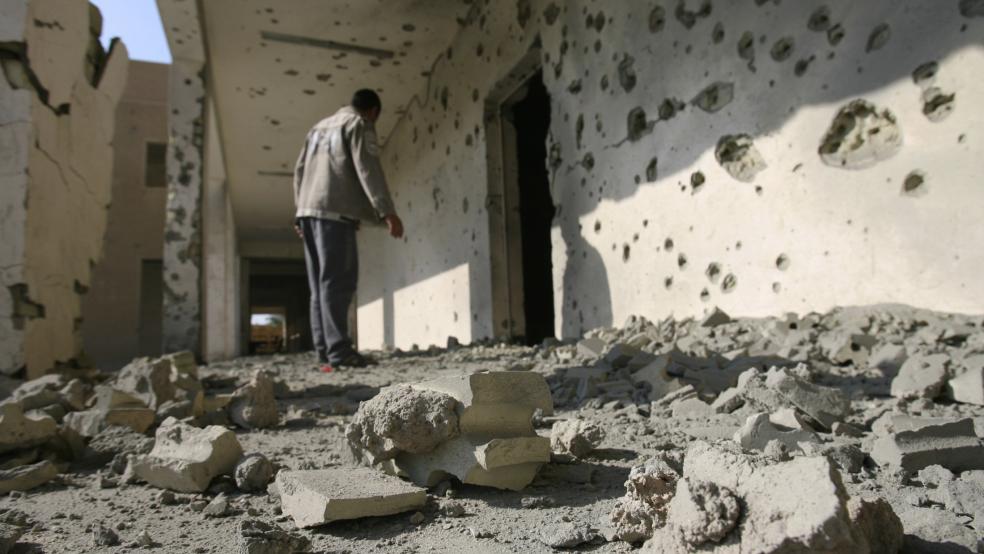The death of more than seventy-five people in terrorist bombings in Iraq on Wednesday was a fresh sign of al-Qaeda’s growing power in the Sunni Middle East. Along with the black flags hoisted this month in Fallujah and Ramadi, the increasing Iraqi violence has unexpectedly forced a pause in the administration’s narrative of counterterrorism success. A brief pause – less than Benghazi merited – but a pause nevertheless.
Politically, the violence is not a problem for Obama--Iraq will forever be George Bush’s war. But strategically, in the real world, the resurgence of al-Qaeda is a disaster brought on by the administration’s obsession with drones as a substitute for foreign policy.
Related: Killer Robots—If No One Pulls the Trigger, Who’s to Blame?
The specific problem of al-Qaeda in Iraq and the Levant has a number of geneses. For one, the abdication of American power in Syria means that radical Sunnis are supplying the rebels with their weapons. Unsurprisingly, the rebellion has become more radical. And among jihadis on the ground, al-Qaeda is a prestige name--it has media exposure, tactical successes, and superpowers shake at its wrath.
Eventually, its allied networks take root and metastasize across state lines; into Iraq, for example, where President Nouri al-Maliki has made every effort to alienate his own Sunni population.
More broadly, though, the growth of al-Qaeda is due to the Obama administration’s single-minded focus on drone warfare and counterterrorism. Drones are dangerous because they’re a false heuristic of success: killing bin Laden and a whole slew of al-Qaeda ‘number threes’ makes the administration’s foreign policy look successful.
The problem is that counterterrorism is an elite policy. It is conducted by a few highly skilled operators against a few less-skilled operators. In the grand scheme of state relations, it is a series of pinpricks that tells us almost nothing about al-Qaeda’s power.
Related: War Gains Lost as Iraq, Afghanistan Descend into Chaos
Just like states, the power of groups like al-Qaeda is shaped by long-term changes in their political and socioeconomic environment, by factors like religious revivals, an unbalanced male-female ratio, or rapid industrialization. The best leaders then augment their power by recognizing when these trends have shifted then begin shifting their policies in response.
For America, these policy choices usually concern allies and are almost always messy. Should the US support an autocrat with whom it shares strategic interests, like Mao or Pinochet or Sadat or Saud? Or turn its back and go it alone, cleaner but weaker? Most presidents since WWII have struck a balance somewhere on this spectrum of power versus morality. Obama, however, has so far voted present, both, or neither.
He has ignored US partners in the Middle East, like Saudi Arabia and Egypt, while also forfeiting the moral benefit of condemning autocracy by reaching out to dictatorships that hate us, like Russia and Iran. It’s the worst of all worlds: realpolitik with no friends, requiring only such engagement necessary to fill in the blast holes. Focused on the minimal requirements of counterterrorism as emergency international spackle, the administration needs Pakistan only as a drone superhighway, Yemen as a drone cul-de-sac, and Israel not at all.
Unfortunately, this minimalist approach to foreign policy comes at a cost: even successful counterterrorism cannot change trends on the ground. For that, you need local power; for power, you need allies; for allies, you need engagement. The resurgence of al-Qaeda in Iraq can be traced to the US disengagement from the Iraqi regime since the last troops departed in 2011.
Related: Islamist Militants Strengthen Grip on Iraq’s Falluja
The administration’s lack of a status-of-forces agreement reduced its ability to assist Iraq politically, and when combined with lower US aid to the Iraqi state, blunted both our carrots and sticks. From $2.74 billion in aid in 2010, US support fell to $1.97 billion in 2011, $1.52 billion in 2012, and a request of $573 million in 2014.
Which is fine – we don’t owe corrupt Arab governments anything – except that Iraq, naturally, then pursued policies that were sub-optimal. Shorn of its American minders, the Shia-dominated government’s increasing sectarianism allowed al-Qaeda to once again take root in the areas where US troops de-rooted it [JL1] in 2006. Add that to the festering sore of the Syrian war, where the radicals are the only ones with weapons, and you have the recipe for a fairly robust al-Qaeda presence, drones or no.
Gone from Iraq, absent from Syria, and no real interest in either. The pivot to Asia is definitely on. Without question, the administration believes counterterrorism a safety net; that if things get bad enough in the Levant, drones can swoop in and destroy a few sub-commanders. Maybe. But both Iraq and Syria should be a lesson that when the influence stops – the money and troops and engagement – so too does American policy.
Andrew L. Peek was a strategic advisor to the top U.S. and NATO commander in Afghanistan. Follow him on Twitter at @AndrewLPeek
Top Reads from The Fiscal Times:






